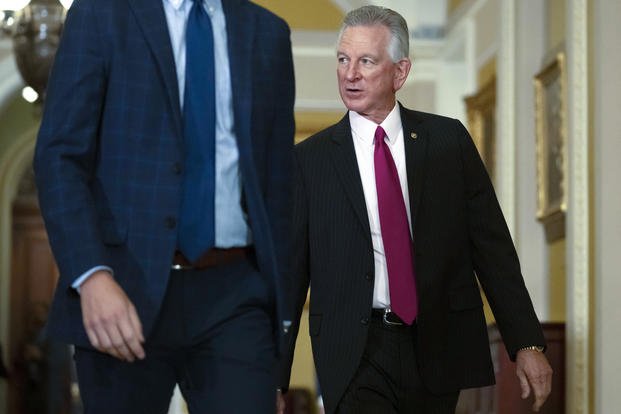The Senate approved new chiefs for the Army and Marine Corps on Thursday following its approval of the next chairman of the Joint Chiefs of Staff on Wednesday night.
The trio of military leaders are the first officer promotions the Senate has confirmed in more than six months since Sen. Tommy Tuberville, R-Ala., started blocking quick approval for all general and admiral nominees in protest of the Pentagon's abortion policy.
A Senate procedural maneuver by Tuberville this week forced Democrats to retreat from their earlier position -- that confirming a few top officers individually with roll call votes would set a bad precedent. But the fate of more than 300 other officers caught in Tuberville's blockade remains up in the air with no clear plan to confirm them.
The Senate voted 96-1 to confirm Gen. Randy George as Army chief of staff, 96-0 to confirm Gen. Eric Smith as Marine commandant, and 83-11 to confirm Gen. Charles "C.Q." Brown as chairman of the Joint Chiefs of Staff.
Asked Thursday whether Senate Majority Leader Charles Schumer, D-N.Y., would set up individual roll call votes on any other nominees, Senate Armed Services Committee Chairman Jack Reed, D-R.I., said that "nothing's on the table, nothing's off the table."
"I think you should ask the Republicans, who voted so enthusiastically for Gen. George and [said] wonderful things about him, because there are so many other people like Gen. George who are really suffering," Reed said when asked what the plan is to confirm the remaining military nominees.
Tuberville voted for George and Smith but against Brown. A smattering of Republicans opposed Brown, who was the first Black service chief and will be the second Black chairman of the Joint Chiefs, because of his support for military diversity efforts.
Sen. Mike Lee, R-Utah, was the lone "no" vote on George.
The three confirmations mean the military will no longer have half of the Joint Chiefs of Staff filled by acting officials. But with Tuberville's broader blockade still in place, the Joint Chiefs will still have leadership gaps, as will hundreds of posts below the chiefs.
The Navy is being led by an acting officer, and the Air Force is on track to join them when Brown steps down as Air Force chief of staff to start his new job.
"It is well past time to confirm the over 300 other military nominees," Defense Secretary Lloyd Austin said in a statement after Brown's confirmation. "The brave men and women of the U.S. military deserve to be led by highly-qualified general and flag officers at this critical moment for our national security.
"And their families, who also sacrifice so much every day on our behalf, deserve certainty and our nation's unwavering support," he said.
Army Secretary Christine Wormuth swore George into his new job shortly after the Senate confirmation vote Thursday, she said in a statement, adding that the remaining holds are a "discouraging signal for the talented junior and field-grade officers as they contemplate their future as senior Army leaders."
Since late February, Tuberville has used a procedural tactic known as a hold to block the Senate from quickly confirming senior officer promotions in an effort to get the Pentagon to reverse its policy of covering travel expenses and leave for service members seeking abortions.
A hold cannot prevent the Senate from confirming nominees, but it forces the chamber to take lengthy individual roll call votes on each nomination rather than confirming them in batches in voice votes as it usually does for noncontroversial military promotions.
For months, Democrats insisted that taking roll call votes could encourage other senators to mimic Tuberville's tactic in the future and forever politicize the military nominations process. In response to GOP proposals to vote on at least members of the Joint Chiefs, Democrats argued that doing so would punish the lower-ranking officers also awaiting confirmation.
While it is rare for Congress to hold roll call votes on military officers, it is not unprecedented for members of the Joint Chiefs of Staff. The current chairman of the Joint Chiefs, Gen. Mark Milley, was confirmed in a roll call vote in 2019, and Brown was confirmed as Air Force chief of staff in a roll call vote in 2020.
Democrats relented and voted on George, Smith and Brown this week to preempt Tuberville after he announced he would force a procedural vote on Smith. While Tuberville still insists he will not drop his hold on the other nominees unless the Pentagon rescinds its abortion policy, he is also leaving open the possibility of trying to force more roll call votes on them.
"I don't have any list made up, but we'll see what Sen. Schumer does in the next couple of weeks, and if he can't do his job, we'll do it for him," Tuberville said. "Maybe."
-- Rebecca Kheel can be reached at rebecca.kheel@military.com. Follow her on X @reporterkheel.












